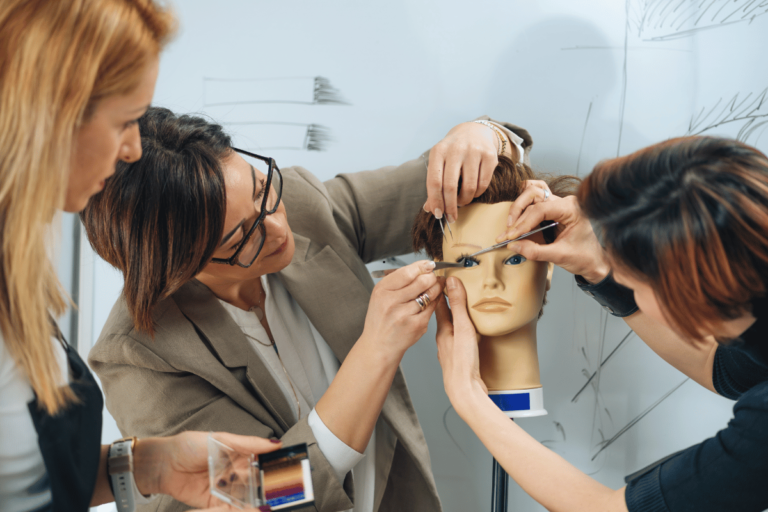Are you a veteran in search of a smooth transition into civilian life? Look no further.
Imagine a bridge that connects your military experience to a fulfilling career. That bridge is vocational training. In this article, we will explore the benefits, programs, and resources available to help veterans like you thrive in vocational training.
Get ready to navigate this new chapter with confidence and discover inspiring success stories of veterans who have found their calling through vocational training.
The future is bright, and we’re here to support your journey.
Key Takeaways
- Vocational training for veterans offers increased job satisfaction, the opportunity to learn new skills, and a sense of fulfillment and pride in work.
- These programs provide specialized training to enhance skills, increase chances of successful job placements, and offer tailored education and hands-on experience.
- Benefits of vocational training programs include enhanced job prospects, specialized skill development, a smooth transition to the civilian workforce, and increased earning potential.
- Veterans in vocational training have access to resources such as the Veterans’ Employment and Training Service (VETS), Department of Veterans Affairs (VA), Disabled American Veterans (DAV), Hire Heroes USA, and Veterans’ Employment and Education Commission (VEEC).
The Benefits of Vocational Training for Veterans
You’ll discover numerous advantages in pursuing vocational training as a veteran. One of the main benefits is the potential for increased job satisfaction. With vocational training, you have the opportunity to learn new skills and gain expertise in a specific field. This can lead to a sense of fulfillment and pride in your work, as you’re able to apply your knowledge and abilities in a meaningful way. Additionally, vocational training can provide you with the necessary tools and resources to excel in your chosen career path, leading to increased job satisfaction and overall happiness.
Another advantage of vocational training for veterans is the potential for career advancement. By acquiring specialized skills through vocational training, you can position yourself for higher-level positions and greater responsibilities within your field. This can lead to increased earning potential and professional growth opportunities. Many vocational training programs also offer certifications or licenses, which can enhance your credibility and marketability in the job market. With these credentials, you may be more likely to secure promotions or job offers that offer greater career advancement opportunities.
Exploring Vocational Training Programs for Veterans
Are you interested in exploring vocational training programs for veterans?
These programs offer a multitude of benefits, including specialized training that can enhance your skills and increase your chances of successful job placements.
Whether you’re looking to transition into a new career or advance in your current field, vocational training programs provide tailored education and hands-on experience to help you achieve your goals.
Benefits of Vocational Training
There are several benefits of vocational training programs for veterans. These programs not only provide job opportunities but also help in skill development, allowing veterans to successfully transition into civilian life. Here’s a table that highlights some of the key benefits of vocational training for veterans:
| Benefits of Vocational Training for Veterans |
|---|
| 1. Enhanced job prospects |
| 2. Specialized skill development |
| 3. Smooth transition to the civilian workforce |
| 4. Increased earning potential |
Vocational training programs offer veterans the chance to acquire new skills or build upon existing ones, making them more competitive in the job market. With specialized training in various fields, veterans can explore a range of job opportunities that align with their interests and abilities. Moreover, these programs facilitate a smooth transition from military to civilian life by providing veterans with the necessary tools and support. By gaining valuable skills, veterans can increase their earning potential and achieve financial stability. Overall, vocational training programs play a vital role in helping veterans succeed in their post-military careers.
Successful Job Placements
Find the ideal job placement through vocational training programs that cater to your specific needs and skills as a veteran.
These programs are designed to equip you with the necessary knowledge and expertise to excel in your chosen career path. By participating in vocational training, you gain access to a wide range of job opportunities that are tailored to your unique skill set.
Whether you’re interested in healthcare, IT, or skilled trades, there are vocational training programs available to help you secure a fulfilling job.
Additionally, these programs offer support and guidance throughout the job placement process, ensuring that you have the tools and resources needed for career advancement.
With vocational training, you can confidently pursue your professional goals and find success in the civilian workforce.
Tailored Training Programs
Discover the wide range of tailored training programs available for veterans, specifically designed to meet your unique needs and help you achieve your career goals. These customized programs are designed to provide you with the skills and knowledge necessary to excel in your chosen field.
Whether you’re interested in healthcare, technology, or skilled trades, there’s a training program available to support your career development. Here are three key benefits of these tailored training programs:
-
Personalized Approach: These programs take into account your prior experience and skills, ensuring that you receive training that builds upon your existing knowledge.
-
Industry-Relevant Curriculum: The training programs are designed in collaboration with industry experts, ensuring that you’re equipped with the most up-to-date skills and knowledge that employers are looking for.
-
Job Placement Assistance: Many of these programs offer job placement assistance, helping you find employment opportunities that align with your newly acquired skills.
With these tailored training programs, you can confidently transition into a new career and achieve your professional goals with the support and guidance you need.
Resources for Veterans in Vocational Training
Get access to valuable resources for veterans in vocational training to support your transition into a new career. As a veteran, you have unique needs and challenges when it comes to finding job placement and support services. Fortunately, there are several organizations and programs dedicated to assisting veterans like you in your vocational training journey.
Here are some resources that can help you navigate the transition and provide the support you need:
| Organization | Services Provided |
|---|---|
| Veterans’ Employment and Training Service (VETS) | Job placement assistance, career counseling, and skills assessment |
| Department of Veterans Affairs (VA) | Education and vocational rehabilitation benefits, counseling services |
| Disabled American Veterans (DAV) | Employment resources, job fairs, and resume assistance |
| Hire Heroes USA | Transition assistance, job placement services, and resume and interview coaching |
| Veterans’ Employment and Education Commission (VEEC) | Job training programs, apprenticeships, and support for veterans with disabilities |
These organizations offer a wide range of services to veterans in vocational training, ensuring that you have the necessary support to succeed in your new career. Whether you need help finding job opportunities, improving your resume, or accessing educational benefits, these resources are here to assist you every step of the way. Remember, you are not alone in this journey, and there are people and organizations ready to support you as you transition into a fulfilling career.
Navigating the Transition: Tips for Veterans in Vocational Training
Take advantage of these helpful tips to navigate your transition successfully and make the most out of your vocational training as a veteran.
Transitioning from military service to vocational training can be a challenging process, but with the right support systems in place, you can overcome any obstacles that come your way.
Here are three important tips to help you navigate your transition:
-
Seek out support: It’s crucial to have a strong support system during this time. Connect with fellow veterans who’ve gone through similar transitions and can provide guidance and understanding. Additionally, reach out to vocational training programs that offer specialized support for veterans. These programs can provide resources, mentorship, and assistance tailored to your unique needs.
-
Set realistic goals: Transitioning into a new career can be overwhelming. Break down your goals into smaller, achievable steps. This will help you stay focused and motivated throughout your vocational training. Celebrate your milestones along the way, as each step forward is a success.
-
Take advantage of resources: There are numerous resources available to veterans in vocational training. From financial aid options to counseling services, make sure to explore all the resources that can support you during this transition. These resources are designed to help you succeed in your training and make a smooth transition into the workforce.
Success Stories: Veterans Thriving in Vocational Careers
With the right skills and support, you can excel in vocational careers, like these veterans who are thriving in their chosen fields. Transitioning from the military to civilian life can be challenging, but many veterans have found success and job satisfaction in vocational careers. These success stories demonstrate the importance of having strong support systems in place.
One example is John, a former Army mechanic who completed a vocational training program in automotive technology. With the help of his instructors and fellow veterans, he gained the skills and confidence needed to start his own auto repair business. Today, John takes pride in his work and finds great satisfaction in helping his customers.
Another success story is Sarah, a Navy veteran who pursued a vocational career in culinary arts. Through a vocational training program, she developed her cooking skills and learned about the business side of the culinary industry. With the support of her mentors, Sarah opened her own catering company and has since been recognized for her exceptional culinary creations.
These success stories highlight the importance of support systems in helping veterans thrive in vocational careers. By providing mentorship, resources, and a sense of community, these support systems play a crucial role in helping veterans transition successfully into civilian life. With the right skills and support, veterans can find meaningful careers that bring them job satisfaction and a sense of fulfillment.
The Future of Vocational Training for Veterans
As you consider the future of vocational training for veterans, it’s important to explore innovative approaches that can enhance their skills and prepare them for the evolving job market. With technological advancements shaping various industries, it’s crucial for vocational training programs to adapt and incorporate these advancements to ensure veterans are equipped with the necessary skills for success.
Here are three key points to consider:
-
Technological advancements in vocational training for veterans: The integration of technology, such as virtual reality simulations and online learning platforms, can provide veterans with immersive and interactive training experiences. This allows them to develop technical skills in a cost-effective and flexible manner.
-
Challenges in implementing vocational training for veterans: One of the main challenges is ensuring accessibility and inclusivity for veterans of diverse backgrounds and abilities. Providing tailored support and accommodations can help overcome barriers and ensure equal opportunities for all veterans.
-
Solutions to challenges in implementing vocational training for veterans: Collaborations between vocational training institutions, government agencies, and veteran support organizations can lead to the development of comprehensive programs that address the specific needs of veterans. Additionally, offering financial assistance, mentorship programs, and job placement services can further support successful transitions into the workforce.
Conclusion
In conclusion, vocational training offers valuable opportunities for veterans to successfully transition into rewarding careers. With the support of resources and programs specifically designed for veterans, they can acquire the skills and knowledge needed to thrive in their chosen fields.
By embracing vocational training, veterans are equipped to overcome challenges and build a brighter future. Remember, Rome wasn’t built in a day, but with dedication and determination, veterans can achieve their professional goals.



